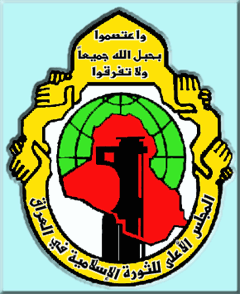Baghdad Putsch

Anyone interested in finding out who has taken power, this is a link to their site, Link Here

By Stirling Newberry t r u t h o u t Perspective
Thursday 11 August 2005
If there were any doubt about whether Iraq is headed down the road to being a failed state, yesterday's deposing of the Mayor of Baghdad by the city council, backed by the military arm of the Shi'ite-controlled Supreme Council for Islamic Revolution in Iraq, should be the clincher. The prosecution can rest.
Who are the SCIRI? Former members of Saddam's Regime? Far from it - the SCIRI consisted of the representatives of the rural Shi'ites who were attacked by Saddam. Their leadership formed part of the large ex-patriot dissident community in London during the 1990s, and they still maintain offices there. They trace their legitimacy to Grand Ayatollah Muhsin Al Hakim, who was the leader of Shia Islam in the 1960s. The organization was formed in 1982, in Iran, and fought against Saddam's Iraqi Army during that conflict. They are backed by Tehran and received support from the "Revolutionary Guard," the shock troops of the Islamic Revolution in Iran. The Badr corps - the SCIRI's military arm - are explicitly modeled after the Revolutionary Guard, and their objective is a Khomeni-style conservative Islamic republic in Iraq. With the invasion, the SCIRI became one of the key groups of nationalist Iraqi Shia - the groups that wanted the US out as quickly as possible.
The conflict between the SCIRI and the Sunni rebellion runs deep; it is widely believed that their original leader, Mohammed Baqir al-Hakim, was assassinated in 2003 by Sunni insurgents, and their vision of a Shia state runs directly counter to the Baathist ideology, even an Islamicized Baathist ideology.
Yesterday's putsch in Baghdad replaced Alaa al-Tamimi, a secular technocrat, with Hussein al-Tahaan, a member of the Badr paramilitary group. The leader of the elected council backed the change, as has, according to a well placed source, the highest levels of the SCIRI. Their position is that the Mayor was not the legitimate head of government in Baghdad, and his removal is legal. Since he was appointed by Bremer, and not elected, this position has some degree of internal logic. The Prime Minister of Iraq, Ibrahim al-Jaafari, had been sitting on al-Tamimi's resignation for weeks, looking for a candidate from his own Dawa Party, rather than from the SCIRI. The elected city council had been pushing back, demanding that either the Mayor be one of their own or that the Mayor's office be reduced in power in relation to the elected body. In short, it is about an internal political feud between the city of Baghdad, whose leaders want a larger budget and control over it, and those in control of the national government, who want Baghdad to be dependent on that government for every droplet of funds it is to get.
This transition means that a large fraction of the armed, organized, and able to govern Shia elite has lost faith in the US backed process, and sees an opportunity to sweep the Sunni completely out of the government. And it means that the unity within the Shia groups is broken. Both of these developments suit the Sunni insurgency just fine - the leading organizations of the insurgency have openly stated that they want a government in the same style as that which Saddam presided over. For them, disenfranchisement of the Sunni minority is a crucial step in the process of radicalizing the Sunni population.
The reason for this move is that the security situation in Iraq itself is disintegrating. One part of the climax at this particular moment is the failure of the constitutional process to come to any form of compromise. The Kurds want a confederation, the Shia a federation with them dominating it, and those Sunni that want to participate, as the minority player, a national government centered in Baghdad. Since the Sunni have the majority of people who have experience in running a central state, this is seen by their moderates as the best possible deal.
However, it would be a gigantic mistake to subscribe to the theory that Sunni violence only climaxes around deadlines drawn by the United States. It is true that the rebellion seeks to disrupt civil participation, but that is not its own goal. The larger goal is for them to fragment the social and political structure of Iraq, and create a "failed state," the way Columbia has large sections of its territory held by the FARC. In the environment of a failed state, the rebels believe that they could reach for power, and take it.
What is clear is that the American presence is no longer contributing to a secure Iraq, and that the various attempts by the American occupation to train or put in place a security force - there have been five separate failed programs to do so - are completely ineffective. American forces are not even able to control the road system in fighting the rebellion; they have absolutely no capability to suppress intra-sectarian political conflict on top of this. The recent "modified limited hang out" by the Pentagon and Rumsfeld is not a sudden attack of honesty, but an orchestrated campaign to convince Americans that we need to fund at least another round of occupation, to the tune of nearly 100 billion dollars, or risk "losing." This is roughly parallel to the attempts by the Joint Chiefs in the Vietnam era to convince LBJ to widen the war, telling enough of the truth of failure to get permission to fail on a larger scale.
Yesterday's events will not herald Iraq's coming apart. But they do mark another step downward in the ability of the United States, regardless of policy, to influence events in Iraq in any meaningful way. For some people, that means making a massive force commitment; for others, it means withdrawal as fast as possible - and count the Bush Administration in this second camp, since they are already on track to pull out of most of Iraq by late 2006. However, the reality is that neither of these courses of action result in any significant change to what yesterday's events generate, and that is that there are now political factions of Iraqis on the ground who are taking control of events, and who have the ability to do so.
This means that what should be occupying America's time is not how or when to leave Iraq - since that decision has already been made, it is only the time table and the name that is in dispute - but how to deal with a world in which Iraq has been destabilized for the time being. Because when it is re-stabilized, it will be under a regime that is fundamentally inimical to the United States at worst, and, at best, hostile as a matter of domestic political necessity
Link Here




0 Comments:
Post a Comment
<< Home